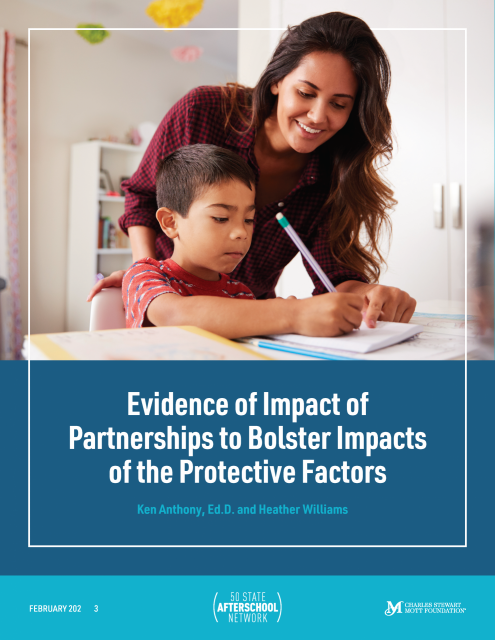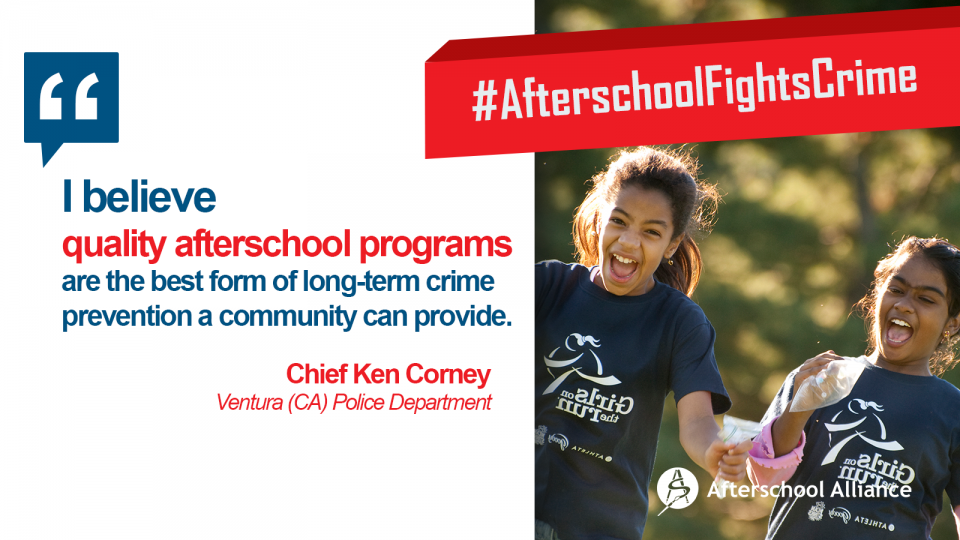OST Research
Evidence of Impact of Partnerships to Bolster Impacts of the Protective Factors
February 2023
A new brief entitled Evidence of Impact of Partnerships to Bolster Impacts of Protective Factors (By Heather Williams, of the California AfterSchool Network and Ken Anthony, Ed.D., Associate Executive Director at the Connecticut After School Network) explores how protective factors identified through resilience research play a crucial role in positive child and youth development, mitigating negative experiences.
Partnerships are essential for supporting whole child recovery. Afterschool programs, acting as community hubs, can unite stakeholders to foster resilience and reduce the impact of trauma on children and youth. Emphasizing protective factors and positive youth development can support children’s social and emotional skills post-pandemic.
This blog post from Afterschool Alliance explores the brief further, also sharing a logic model helps unpack some of the potential impacts and implications community-wide partnerships can have on the success of children and youth.
Promoting Protective Factors in California’s Afterschool Programs
June 2021
This report was created by WestEd and commissioned by the California AfterSchool Network.
The report, drawing on data from the California Healthy Kids Survey (CHKS), examines the extent to which afterschool programs* may help foster more protective factors among its participants compared to their peers who were not program participants.
Below are some excerpts from the report that outline the Protective Factors Framework and key findings.
From Risk to Opportunity: Afterschool Programs Keep Kids Safe When Juvenile Crime Peaks
Fight Crime: Invest in Kids released a new report that reinforces the vital role that afterschool programs play in turning the hours after school, and before parents return home from work, into a time of learning and growth for our young people.
History of Afterschool In America Documentary Released!
Temescal Associates recently completed a 60-minute documentary on the history of afterschool. The documentary has been broken into 12 chapters (ranging from 2 – 15 minutes in length). It includes interviews with 15 afterschool leaders, historical imagery, and narration by Pedro Noguera. Check it out here!
America After 3PM Survey Reports More Parents Enrolling Kids in Summer Programs
A recent research report from America After 3 PM reveals that there is growing interest expressed by parents in enrolling their children into summer learning programs, with 51% of surveyed families indicating that they want their children to participate in a summer program. Furthermore, the percentage of families reporting at least one child enrolled in a summer learning program has significantly risen from 25% to 33% in the past four years. These trends are consistent with an increasing number of parents supporting public funding for these summer programs.
California Afterschool Advocacy Brief
The California Afterschool Advocacy Alliance (CA3) has recently
released a brief which supports the funding of afterschool
programs through the use of the Local Control Funding Formula
(LCFF). The brief argues that using LCFF dollars would expand
programs to a wider range of schools across California, therefore
increasing the reach to students, and enhance program
quality.
With evidence from California-specific research, the brief
outlines three primary reasons why the LCFF funds should be used
towards afterschool programs:
Putting Summer to Work: Summer Matters Report
The Summer Matters Campaign has released three reports that emphasize the positive impact that high-quality summer learning programs can have on students and teachers across six communities in California. Using data collected from previous summer programs and intensive research, the reports provide guidelines for facilitators on how to support students’ growth and further staff professional development.
NAEP Report
As announced by the release of the 2013 National Assessment for Educational Progress Report on November 7, students in California continue to trail behind other states in the subjects of reading and math. While there has been demonstrated progress, fourth graders were ranked 47th in both areas, while eighth graders ranked 45th in math and 42nd in reading.
To access the complete results, click here.









